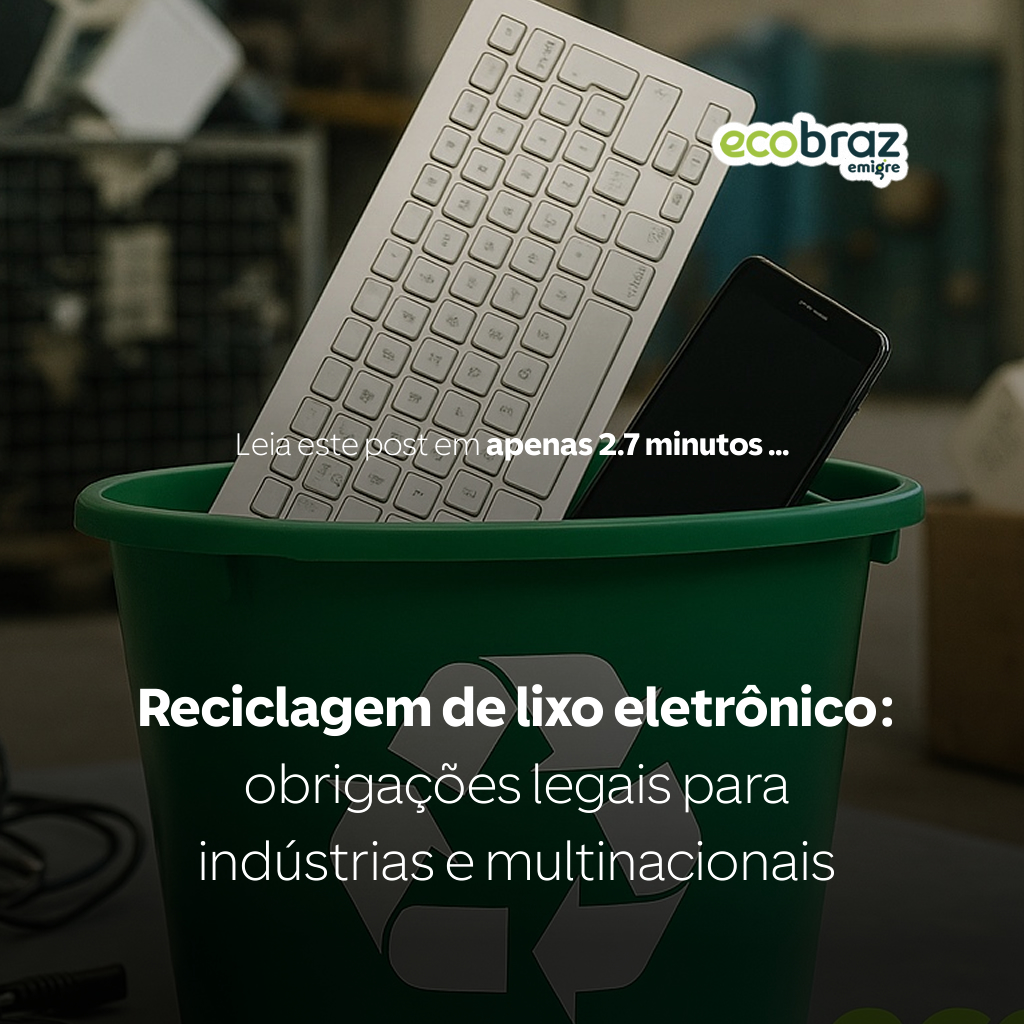Blog Ecobraz Eigre

Electronic Waste Recycling: Legal Obligations for Industries and Multinationals
Introduction: The growth of electronic waste
The rapid expansion of technology consumption has brought many benefits but also a growing problem: electronic waste. Computers, cell phones, printers, TVs, cables, batteries, and appliances are discarded in massive quantities every year.
According to the UN, Brazil is the largest generator of electronic waste in Latin America, with millions of tons discarded annually. For industries and multinationals, this means direct responsibility: improper disposal can lead to multimillion-dollar fines, lawsuits, and irreparable damage to corporate reputation.
What Brazilian legislation says
The National Solid Waste Policy (Law No. 12.305/2010) is the regulatory framework that requires companies to implement reverse logistics systems and ensure the environmentally appropriate disposal of waste.
Key points of the law for industries and multinationals:
-
Shared responsibility → manufacturers, importers, distributors, and retailers share responsibility for product life cycles.
-
Mandatory reverse logistics → companies must create or join systems for collection and recycling of electronics.
-
Documentation and traceability → issuance of manifests, reports, and invoices proving proper disposal.
-
Post-consumer responsibility → companies remain accountable for the correct disposal even after product sale.
-
Severe penalties → environmental fines can reach millions, along with restrictions in bidding processes and even criminal liability in severe cases.
Risks of non-compliance
Ignoring or neglecting legal obligations regarding electronic waste can have severe consequences for large companies:
-
Fines and lawsuits → administrative, civil, and criminal penalties.
-
Loss of certifications → inability to maintain or obtain sustainability seals (ISO, LEED).
-
Trade barriers → international clients and partners demand ESG compliance proof.
-
Reputation damage → environmental scandals harm competitiveness and investor trust.
How multinationals are adapting
Global companies have realized that legal compliance alone is not enough: recycling must be turned into a strategic differentiator.
Many multinationals in Brazil have already:
-
Implemented corporate collection programs for obsolete equipment.
-
Created internal processes for sorting and triage.
-
Partnered with specialized NGOs like Ecobraz to ensure compliance and positive social impact.
Ecobraz: the complete solution for legal compliance
Ecobraz Emigre provides industries and multinationals with the full structure needed to comply with PNRS safely and transparently:
-
Nationwide collection → coverage across all Brazilian territory.
-
Full infrastructure → specialized units for storage, dismantling, and recycling.
-
Documentation and reporting → manifests, invoices, technical reports, ESG reporting.
-
Legal security → full compliance guaranteed for audits and inspections.
-
Social impact → proceeds are reinvested in digital inclusion projects in underserved communities.
Benefits beyond compliance
Meeting legal requirements should not be seen as a cost but as a strategic opportunity:
-
Competitiveness → compliant companies win more contracts, especially in public bids.
-
Sustainable marketing → communicating recycling practices strengthens brand positioning.
-
Circular economy → raw material reuse lowers costs and reduces reliance on extraction.
-
Support for ESG goals → sustainability reports become more consistent and credible.
Conclusion: An obligation that becomes an advantage
For industries and multinationals, electronic waste recycling is not just a legal requirement but also a smart business strategy. In addition to avoiding legal risks, it builds reputation, strengthens ESG commitments, and supports the circular economy.
👉 Ecobraz Emigre is the ideal partner to transform a legal obligation into a competitive advantage: the world’s largest NGO in electronic waste recycling, combining credibility, documentation, and social impact.

Deixe um comentário
O seu endereço de e-mail não será publicado. Campos obrigatórios são marcados com *